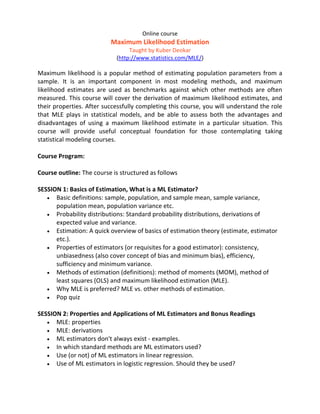
Maximum Likelihood Estimation
- 1. Online course Maximum Likelihood Estimation Taught by Kuber Deokar (http://www.statistics.com/MLE/) Maximum likelihood is a popular method of estimating population parameters from a sample. It is an important component in most modeling methods, and maximum likelihood estimates are used as benchmarks against which other methods are often measured. This course will cover the derivation of maximum likelihood estimates, and their properties. After successfully completing this course, you will understand the role that MLE plays in statistical models, and be able to assess both the advantages and disadvantages of using a maximum likelihood estimate in a particular situation. This course will provide useful conceptual foundation for those contemplating taking statistical modeling courses. Course Program: Course outline: The course is structured as follows SESSION 1: Basics of Estimation, What is a ML Estimator? Basic definitions: sample, population, and sample mean, sample variance, population mean, population variance etc. Probability distributions: Standard probability distributions, derivations of expected value and variance. Estimation: A quick overview of basics of estimation theory (estimate, estimator etc.). Properties of estimators (or requisites for a good estimator): consistency, unbiasedness (also cover concept of bias and minimum bias), efficiency, sufficiency and minimum variance. Methods of estimation (definitions): method of moments (MOM), method of least squares (OLS) and maximum likelihood estimation (MLE). Why MLE is preferred? MLE vs. other methods of estimation. Pop quiz SESSION 2: Properties and Applications of ML Estimators and Bonus Readings MLE: properties MLE: derivations ML estimators don't always exist - examples. In which standard methods are ML estimators used? Use (or not) of ML estimators in linear regression. Use of ML estimators in logistic regression. Should they be used?
- 2. Tests of hypotheses: tests based on the sampling distribution of the ML estimator Pop quiz Bonus reading material: further readings/references Homework: Homework in this course consists of short answer questions to test concepts and guided data analysis problems using software. Mr. Kuber Deokar holds a Masters degree in Statistics from University of Pune, India, where he also taught undergraduate statistics. Mr. Deokar holds the position of Instructional Operations Supervisor at Statistics.com. He is responsible for coordination of statistics.com online courses, and ensures seamless interactions between the management team, course instructors, teaching assistants and students. He also serves as the senior teaching assistant and shares instructional responsibilities for several courses, and handles consultancy assignments, working from in our office in Pune, India. Who Should Take This Course: Anyone who need to understand the theory behind those methods should take this course first. This course takes place over the internet at the Institute for 2 weeks. During each course week, you participate at times of your own choosing - there are no set times when you must be online. The course typically requires 15 hours per week. Course participants will be given access to a private discussion board so that they will be able to ask questions and exchange comments with instructor, Mr. Kuber Deokar. The class discussions led by the instructor, you can post questions, seek clarification, and interact with your fellow students and the instructor. For Indian participants statistics.com accepts registration for its courses at reduced prices in Indian Rupees through us, the Center for eLearning and Training (C-eLT), Pune. For India Registration and pricing, please visit us at www.india.statistics.com. Email: info@c-elt.com Call: +91 020 66009116 Websites: www.india.statistics.com www.c-elt.com
